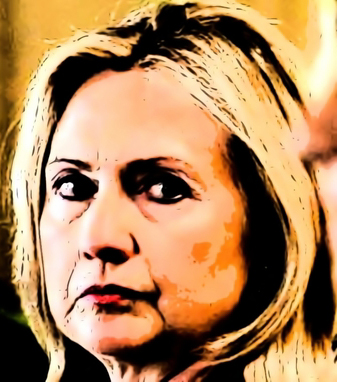
Lagging support among Hispanic voters for Democratic presidential candidate Hillary Clinton and congressional candidates in crucial races has stoked deep concern that the party and the presidential campaign are doing too little to galvanize a key constituency.
While Clinton holds a significant lead over Republican rival Donald Trump in every poll of Hispanic voters, less clear is whether these voters will turn out in numbers that Democrats are counting on to win. Clinton trails President Barack Obama's 2012 performance in several Latino-rich states including Florida, Nevada, Colorado and Arizona. In those same states, where Democrats' goal of retaking the Senate hinge, some down-ballot Democrats remain unknown to many Hispanic voters.
That reality has prompted a flurry of criticism of Clinton's and the party's Hispanic strategies. Despite a uniquely favorable environment with Trump's repeated attacks on undocumented immigrants, Democrats are increasingly worried that the opportunity is slipping away to meet a longstanding party goal of marshaling the nation's growing Hispanic population into a permanent electoral force. The concerns are compounded by Trump's recent surge in several battleground states.
"We're not seeing the Democratic Party take advantage of this moment in time, really looking to leverage more engagement in a more strategic way with our community," said Janet Murguia, president of the National Council of La Raza.
One top criticism is that Clinton waited until this month to launch a sustained campaign of traditional, Spanish-language ads in key markets. Previously, the campaign's Hispanic strategy centered on reaching millennial voters through new media such as Facebook and YouTube. Its television outreach was produced primarily in English and aimed at bilingual households. According to critics, Clinton missed a chance to deploy a broader effort to target the Hispanic electorate such as the one that Obama pioneered four years ago.
"This approach may end up being vindicated on Election Day," said Fernand Amandi, a veteran strategist who led Obama's research, messaging and paid media operation for the Hispanic vote in 2012. "I just find it to be more risky than replicating what we know worked, which is the sustained approach that the Obama campaign put in place."
Clinton aides and her allies insist that they are facing a very different opponent than Obama's, along with new challenges posed by a Hispanic electorate that grows younger and less reliant on traditional modes of communication with each passing cycle.
The dispute goes to the heart of a debate among Hispanic operatives about how much emphasis should be placed on newer ways of reaching younger Hispanics, who like millennials overall are more resistant to backing Clinton than older Latinos.
"A lot of it has evolved to include outreach that isn't obvious to people who are used to doing it old school," said veteran Democratic strategist Maria Cardona. "The Clinton campaign and the DNC are very strategically focused on Latino millennials."
Much of the upset is also focused on down-ballot House and Senate races. Even Clinton has said any hope that Democrats can retake majorities rests on Hispanic turnout. Yet neither the Democratic Senatorial Campaign Committee nor the Democratic Congressional Campaign Committee employ Hispanic outreach coordinators, according to Albert Morales, who held that job until March for the Democratic National Committee.
"The DSCC has never really had a robust or a Hispanic engagement effort that I ever coordinated with, and that's saying a lot being at the DNC under three different chairmen," Morales said. "I couldn't name one. If you were to ask me, name a Hispanic staffer who's been at the DSCC, I couldn't name it. That's pretty sad."
As a result, critics say, the party is failing to capitalize on anger at Trump in a way that would help down-ballot candidates.
For instance: According to recent polls, just 40 percent of Hispanic voters say they believe that Trump will make good on his campaign pledge to deport all 11 million undocumented immigrants. That means that a key argument of the Democrats' case against him isn't sinking in.
"What really scares me is the non-motivation down-ballot of targeting Latinos for Senate and congressional races," said Chuck Rocha, a Democratic political consultant who worked on the presidential campaign of Sen. Bernie Sanders of Vermont.
In Florida, Republican Sen. Marco Rubio has a seven-point edge among Latinos against Democratic Rep. Patrick Murphy, according to a poll released by Univision News last week. Rubio's Cuban American heritage may be Murphy's biggest hurdle, but Murphy is also widely unknown among Hispanics: 6 in 10 said they didn't know enough about him to register an opinion, the poll said.
Arizona tells a similar story. Democratic Rep. Ann Kirkpatrick, who is hoping to unseat incumbent Republican Sen. John McCain, is unknown by 4 in 10 Hispanics, even though she leads 50 percent to 35 percent among them, according to the same Univision survey.
In Nevada, where former Democratic attorney general Catherine Cortez Masto hopes to become the first Latina elected to the Senate, she's leading Rep. Joseph Heck, R, among Hispanics 58 percent to 24 percent - but 38 percent of Hispanics don't know enough about her to register an opinion.
"You can never do too much, there's more to be done, yes," said Senate Minority Leader Harry Reid, D-Nev. "I think there's more to do around the country, but it's just expensive."
DSCC spokeswoman Lauren Passalacqua said the committee is in the process of rolling out a more focused strategy in the closing weeks in key states. She also noted that Cortez Masto and Kirkpatrick are already airing Spanish TV ads.
According to the DCCC, which coordinates House races for Democrats, Spanish-language television and radio ads are on the air in a House race in Texas and another in Florida, with more likely to go up soon. The committee's biggest effort this cycle has been to hire local, Spanish-speaking organizers earlier than ever to register and turn out voters in key districts.
"This is a new approach that we believe will work," said Rep. Ben Ray Luján, D-N.M., the first Latino chairman of the committee.
Also of concern to Rocha and others is the lack of messaging on bread-and-butter topics beyond immigration such as the economy, education and health care - issues that are important to most voters, including Hispanics.
In contrast, Obama's first Spanish language ads in 2012 were focused on health care and education, including Head Start and Pell Grants, which provide aid to poor students who attend college.
"Being part of the Bernie team for so long and seeing how the message of free college and raising the minimum wage resonated, I just don't see that out there now that I'm working on these races where there's a lot of Latinos," Rocha said.
Obama also targeted the intricacies of the Latino community, according to Freddy Balsera, a Miami-based political consultant who crafted much of Obama's Spanish-language advertising campaign in 2008.
"When we were talking to a Latino voter in Colorado, we were discussing issues that mattered to them there. We did the same thing in Florida and took it a step further by talking to South Florida Hispanics with an announcer who was more Cuban-sounding. It was a more Puerto Rican-sounding voice in Orlando," Balsera said. "We really, really localized the message and understood there's not a Pan-Hispanic community. And as such, there's no universal pan-Hispanic messages."
Veterans of Obama's 2012 race said the campaign determined in early 2011 that they needed an aggressive strategy to turnout minority voters - especially Hispanics - in anticipation of a drop-off in support among white voters. It involved early, heavy advertising on Spanish language television, including one voiced in Spanish by Obama and others by Cristina Saralegui, who has been described as the "Spanish Oprah." Those efforts were paired with targeted grassroots outreach and an aggressive field program.
Clinton aides said they began putting Latino organizers on the ground in May, both in Hispanic-rich battlegrounds and in other states with smaller but potentially pivotal Latino populations including Wisconsin, Iowa, Georgia, Ohio and Nebraska.
The effort includes programs targeting various groups within the Hispanic community, including undocumented immigrant children, or DREAMers and their families, small business owners, and a program targeted at Latino faith leaders.
Soon, the campaign plans to bus Puerto Rican supporters from New York into Pennsylvania, where they will canvass in towns and neighborhoods full of Puerto Rican transplants including Bethlehem, Lancaster and North Philadelphia. Also under consideration is flying Puerto Ricans from the island to door-knock in Florida .
But the campaign's investment in the kind of targeted advertising that was pioneered in 2012 has been smaller and has come later. And the question of language has been a key spark in the debate.
Until recently, much of Clinton's television advertising to Hispanic voters has been in English, a concerted decision aimed at reaching bilingual households.
"All of these tactics complement each other. One part of course is Spanish language ads. But the other part targets English-dominant Hispanics," said Clinton's director of Latino Outreach Lorella Praeli. "We're also very comfortable spending time in the Spanglish space - that's the way that we communicate."
A new Spanish-language radio ad released this week and airing in Florida, Nevada and Ohio, is voiced by Clinton's running mate, Sen. Tim Kaine, D-Va. In Spanish, Kaine touts his work as a Jesuit missionary in Honduras - part of the senator's backstory that Clinton campaign aides believe will resonate with Hispanics, who are predominantly Catholic and who generally revere Pope Francis, the first Jesuit pontiff.
That kind of Spanish delivery can matter, said Federico de Jesus, who served as Obama's Hispanic communications director during the 2008 campaign, noting that they received positive feedback in 2008 when Obama's Spanish ads included him approving the ad in Spanish: "Soy Barack Obama y yo apruebo este mensaje."
This year, Clinton's Spanish ads only have her saying, "Soy Hillary Clinton, and I approve this message."
"It's fine that she did only part of it, but it's different," DeJesus said.
Amandi, the veteran strategist of Obama's 2012 campaign, questioned the wisdom of waiting to engage in Spanish until the end.
"The question I would ask is what message does that send to the Spanish dominant Hispanic voters?" Amandi asked. "That they're not as important as the English language Hispanic voters by waiting this late in the cycle to engage with them?"
Previously:
• 06/10/16 Hillary is signaling to her party that she won't move to the center in the general election
• 02/16/16 Hillary's most dangerous antagonist --- her hubby
• 12/02/15 New phase in GOP race as candidates sharpen their attacks



 Contact The Editor
Contact The Editor
 Articles By This Author
Articles By This Author